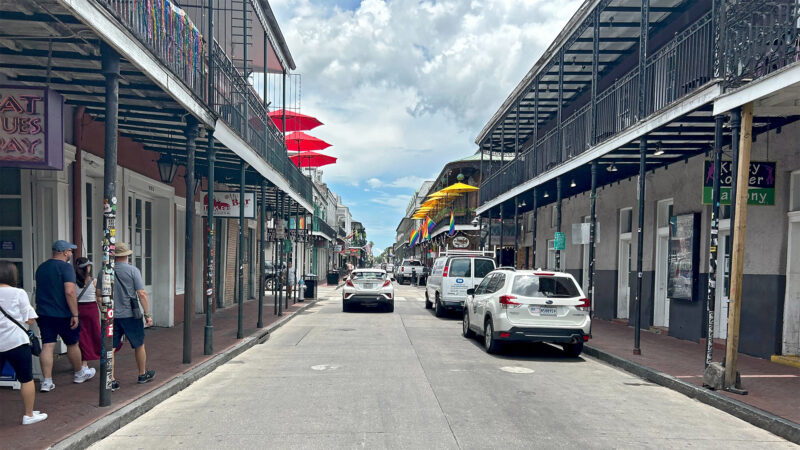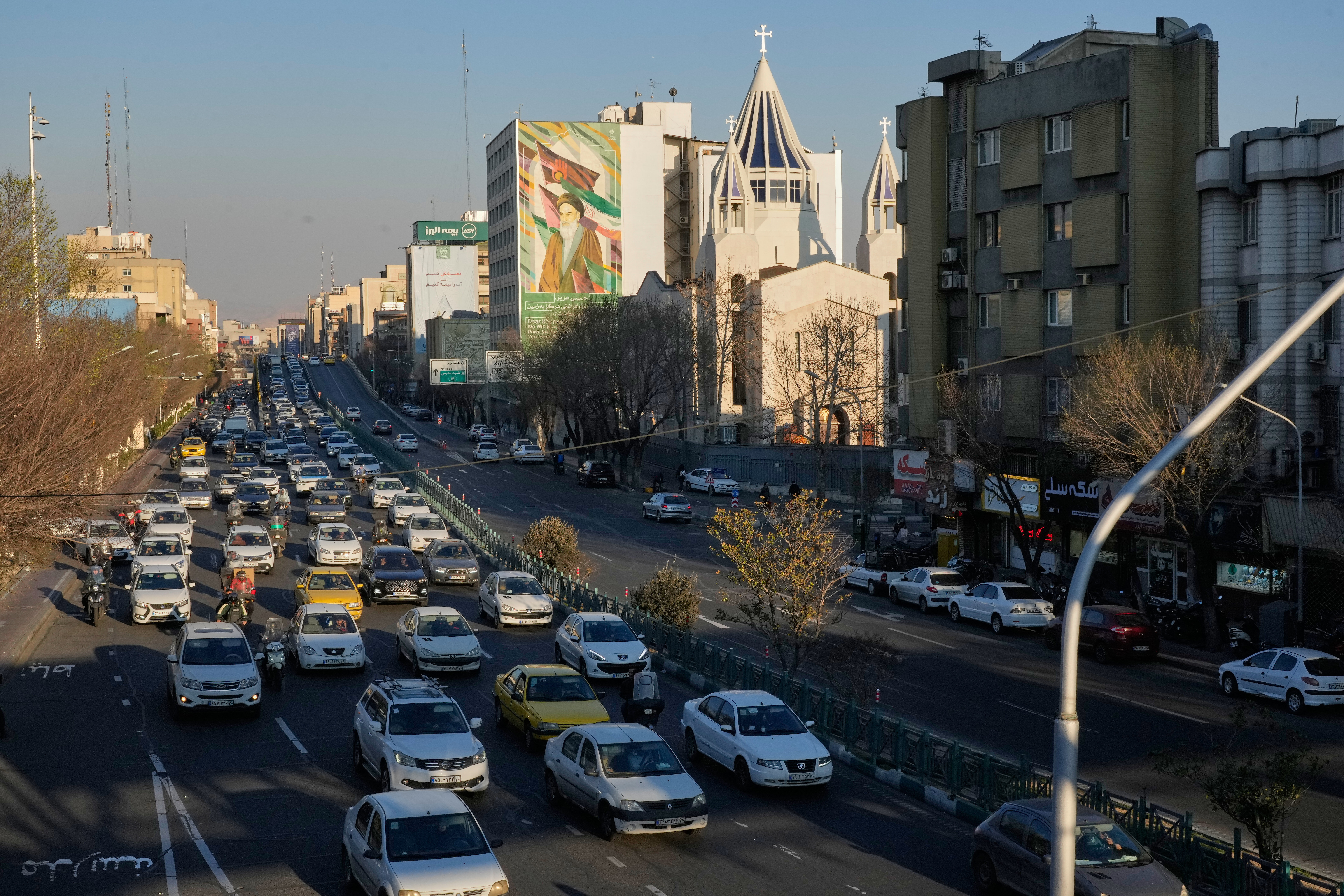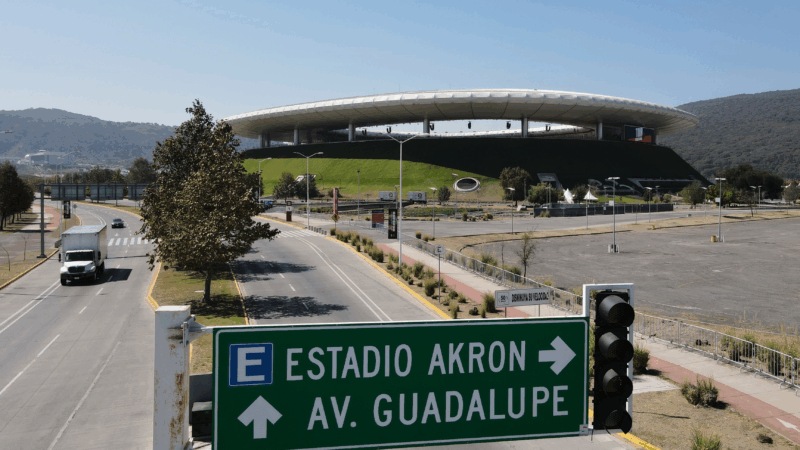Should heat waves get names like hurricanes? Some believe it could help save lives
Bourbon Street in New Orleans is hot and quiet just after 1 p.m. on June 26, 2024. The city is under a heat advisory and tourists and residents alike take shelter in the bars and shade beneath the galleries. (Drew Hawkins/Gulf States Newsroom)
It’s June 26 — just days after the official start of the summer — and it’s just past one in the afternoon on Bourbon Street. The sun is high in the sky with no cloud cover. The convection-like wind moves through the streets, providing no relief.
The city is under a heat advisory and the heat index says it feels like 104 degrees. But for local chef Maestro Latouche, it’s otherworldly — or maybe underworldly.
“The heat right now in New Orleans is like on fire, is like hell itself,” Latouche says in a patois thick as molasses as he leans against a building during a break he says feels like no break at all.
The street is nearly empty. People take shelter in the bars and beneath the iconic French Quarter galleries.
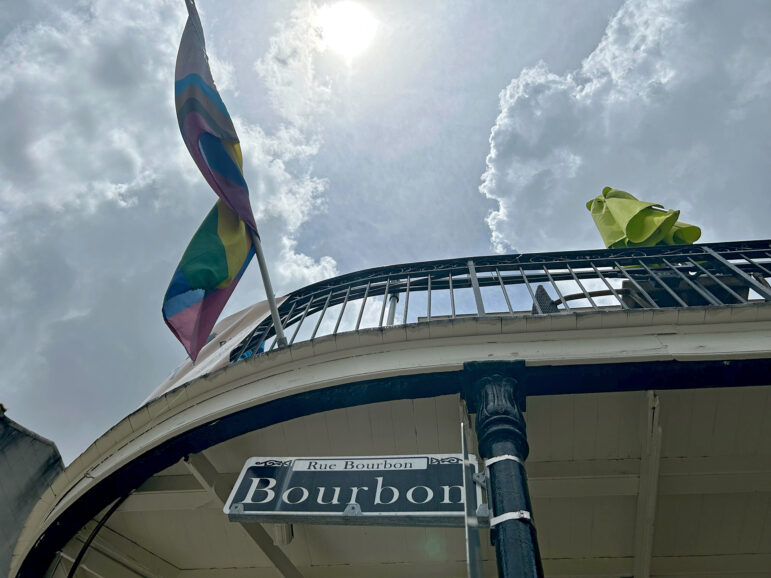
“Anywhere there’s shade,” says Rhonda Bass. “We’ve been out walking around and I was surprised how fast I got hot.”
Rhonda and her husband, Steve, are in town visiting from Texas, so they’re no strangers to heat.
“We know all about it,” Rhonda says with a laugh.
Last year was the hottest year on record in New Orleans, with 17 days over 100 degrees. Research shows that because of climate change, each summer may be hotter than the last moving forward.
As heat waves and heat domes become more intense, there’s a new idea gaining traction: naming extreme heat events as we do with other major disasters — like wildfires and hurricanes.
Extreme heat is deadlier than hurricanes, floods, and tornadoes combined, and advocates for the practice say a name could help improve the way we communicate about dangerous levels of heat.
The idea is new to Rhonda as well.
“I think it’s interesting, really,” she says. “I think they should do it.”
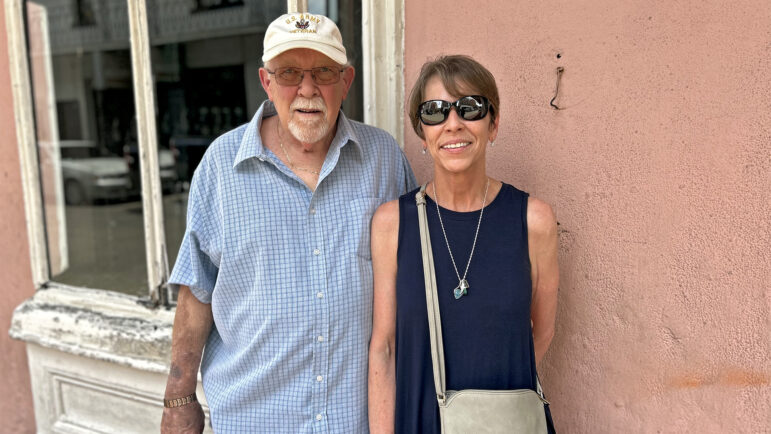
Up and down the French Quarter, nearly everyone agrees with Rhonda that naming heat would change the way they think about it.
“I think it would be an absolutely great idea,” says Walt McDaniel a doorman at the Tipsy Trumpet restaurant and bar. “Health-wise, mostly. This heat is so intense. Whether you’re young, you’re old or whatever. It’s overbearing.”
One of McDaniel’s co-workers, an eccentric, energetic server who gives his name as “Nicolas Swag Master, a.k.a The King, a.k.a Big Master, N-I-C-S-W-A-G, Big Swag” leaps over the velvet rope blocking an entrance and says people would take more precautions if extreme heat had a name.
“Most definitely,” he says. “If today if they said, ‘Heat check, heat check, scorcher, scorcher is coming out,’ I’m staying inside, I’m calling off work.”
The policy of naming extreme heat has only been tried out in a few places in Europe, and some in Australia are also floating the idea. Early research shows people may take more precautions when dangerously high heat waves have a name.
A study conducted in Seville, Spain after the launch of proMeteo Sevilla, the city’s heat wave naming and categorization system, indicates that naming a heat wave seems to have made a difference. Following the world’s first named heat wave — Heat Wave Zoe Sevilla — the research data indicated the name raised awareness and better informed residents about its dangerous effects.
While asking people drinking in the middle of the day in the French Quarter what they think doesn’t uphold the rigors of academic research or satisfy standards of peer review, everyone seemed to agree that the idea could raise awareness here, too.
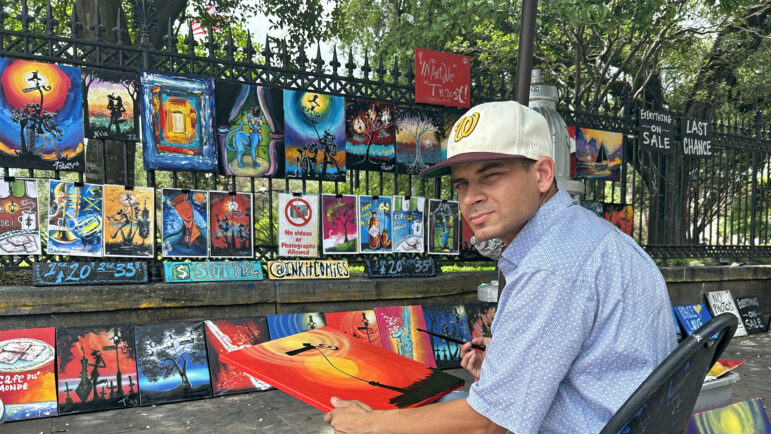
The disagreement lay around what to name extreme heat, with suggestions ranging from “Scorcher,” to “Hot as Hell,” and several others colored with expletives.
“Bomb ass heat wave, bro,” says Riley Hanson, in town from Arizona, which has already seen record-setting heat waves this year. Hanson has his own theories on how to pick a name.
“Maybe after a hot actress or something like that,” he says, wiping sweat from his forehead.
All jokes aside, even advocates of naming extreme heat aren’t sure what the best approach should be.
“I were in charge, I think I would name them Heat Wave Exxon Mobil, Heat Wave Chevron,” said Jeff Goodell, author of the book “The Heat Will Kill You First.”
The book’s title is certainly attention-grabbing, and Goodell said that’s the point — just like putting a name on extreme heat.
“People will pay attention more than if you just say, ‘Oh, it’s going to be 97 degrees for four days in a row,’” Goodell said. “You know, ‘Heat Wave Lucifer will be here this weekend.’”
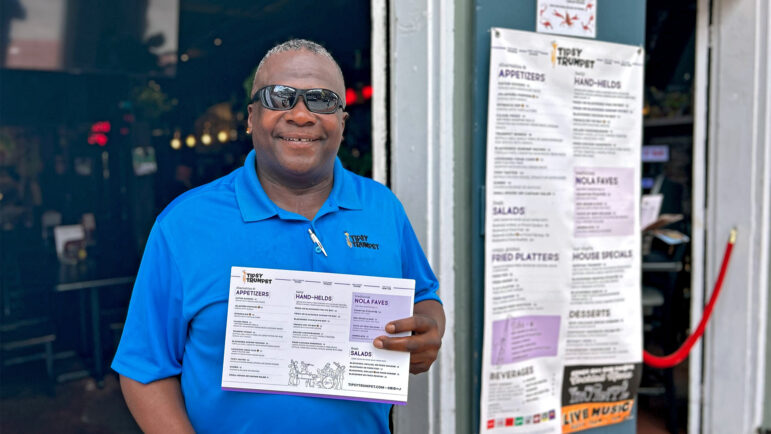
The World Meteorological Organization opposes naming heat waves, arguing it could mislead and distract the public and reduce the effectiveness of the current heat advisory in place.
Just because it works for hurricanes, doesn’t mean it would work for heat waves. Unlike tropical cyclones, heat waves lack clear distinctions and predictability. Critics also say that naming heat may not be effective because there isn’t enough research to support it at this point.
The National Weather Service is not seriously considering adding a naming system for heat any time soon. Goodell said they are considering it, but it’s not a hasty decision.
“This is not simply like a marketing campaign that Nike rolls out to rebrand how you think about their shoes. This is life and death messaging,” Goodell said. “There’s a lot of complexity in this. And to their credit, they don’t want to get it wrong. And so they’re taking it very slowly.”
Naming heat may not change much for people who have to work in the heat, though.
“I got to go to work no matter what,” says local fisherman Nathan Boudreaux. “It could be rain, sleet, snow, tornadoes. I got to come to work.”
Boudreaux is standing in the Westwego Shrimp Lot just outside of New Orleans — think daily farmer’s market for local seafood. It’s a melting pot — or in this instance, a gumbo pot — of the region’s cultures with Cajun, Creole, Black and Vietnamese vendors and fishermen.
The same sun burning over the French Quarter burns here, reflected and amplified by the lot’s gravel.
While Boudreaux said naming heat is a good idea, but wouldn’t change much for him, others disagreed.
“I wouldn’t come to work that often, I know that much,” says Susie Oubre.
Standing in the shade of her booth, she’s bagging fresh shrimp, just like she has for the past 40 years. Oubre says she’s seen the heat get worse and worse, and a name could make a difference for her.
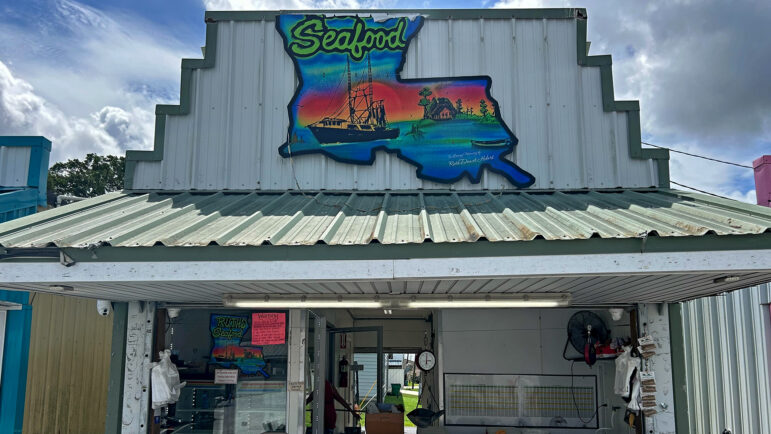
“Because I’m too old. I’m getting to that age where I can’t come out here like that and it’s too hot,” she says.
Once upon a time, naming hurricanes was a new idea, too. It was only started in the 1950s. After decades of major storms like Maria, Rita and Ivan, not everyone chooses to or can evacuate.
According to the World Meteorological Organization, naming storms is the fastest and most effective way to communicate warnings and raise awareness and preparedness. It makes them easier to track and discuss. And, it can help with historical record-keeping and research on storm impacts — just ask any New Orleanian what the names Katrina or Ida mean to them.
So while naming heat waves and domes may be new for now, it could become standard in the future as another way we adapt to an increasingly hot world.
This story was produced by the Gulf States Newsroom, a collaboration between Mississippi Public Broadcasting, WBHM in Alabama, WWNO and WRKF in Louisiana and NPR. Support for health equity coverage comes from The Commonwealth Fund.
U.S. and Iran to hold a third round of nuclear talks in Geneva
Iran and the United States prepared to meet Thursday in Geneva for nuclear negotiations, as America has gathered a fleet of aircraft and warships to the Middle East to pressure Tehran into a deal.
FIFA’s Infantino confident Mexico can co-host World Cup despite cartel violence
FIFA President Gianni Infantino says he has "complete confidence" in Mexico as a World Cup co-host despite days of cartel violence in the country that has left at least 70 people dead.
Supreme Court appears split in tax foreclosure case
At issue is whether a county can seize homeowners' residence for unpaid property taxes and sell the house at auction for less than the homeowners would get if they put their home on the market themselves.
Top House Dem wants Justice Department to explain missing Trump-related Epstein files
After NPR reporting revealed dozens of pages of Epstein files related to President Trump appear to be missing from the public record, a top House Democrat wants to know why.
ICE won’t be at polling places this year, a Trump DHS official promises
In a call with top state voting officials, a Department of Homeland Security official stated unequivocally that immigration agents would not be patrolling polling places during this year's midterms.
Cubans from US killed after speedboat opens fire on island’s troops, Havana says
Cuba says the 10 passengers on a boat that opened fire on its soldiers were armed Cubans living in the U.S. who were trying to infiltrate the island and unleash terrorism. Secretary of State Marco Rubio says the U.S. is gathering its own information.

